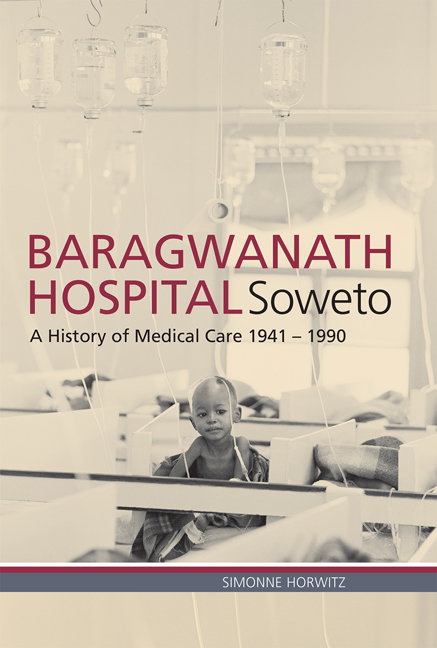Book contents
- Frontmatter
- Contents
- Acknowledgements
- List of Illustrations
- List of Abbreviations
- A note on terminology
- 1 Introduction: A Hospital in Soweto
- 2 From Allied Military Hospital to Urban African Hospital
- 3 Apartheid and Administration: The Hospital, Provincial Administration and the University of the Witwatersrand
- 4 Missionaries, Clinicians, Activists and Bara Boeties: The Doctors of Baragwanath Hospital
- 5 Black Nurses in White: The Nurses of Baragwanath Hospital
- 6 Chronic contradictions: The struggle of Baragwanath in the 1980s
- 7 Baragwanath's Transition and Legacy
- Bibliography
- Index
- Plate Section
1 - Introduction: A Hospital in Soweto
Published online by Cambridge University Press: 20 April 2018
- Frontmatter
- Contents
- Acknowledgements
- List of Illustrations
- List of Abbreviations
- A note on terminology
- 1 Introduction: A Hospital in Soweto
- 2 From Allied Military Hospital to Urban African Hospital
- 3 Apartheid and Administration: The Hospital, Provincial Administration and the University of the Witwatersrand
- 4 Missionaries, Clinicians, Activists and Bara Boeties: The Doctors of Baragwanath Hospital
- 5 Black Nurses in White: The Nurses of Baragwanath Hospital
- 6 Chronic contradictions: The struggle of Baragwanath in the 1980s
- 7 Baragwanath's Transition and Legacy
- Bibliography
- Index
- Plate Section
Summary
Intake night – Baragwanath Hospital
Mbuyiseni Oswald Mtshali
The ward was like a battlefield –
victims of war
waged in the dark alley
flocked in cars, taxis, ambulances, vans and trucks.
They bore
knife wounds
axe wounds
bullet wounds
burns and lacerations.
A stench
of fresh blood
warm urine
excreta,
mingled with iodine and methylated spirits.
Groans
sighs
moans – Help me doctor!
curses – C'mon bloody nurse!
Doctors darting
from place to place
with harried nurses at their sides.
‘So! It's Friday night!
Everybody is enjoying
in Soweto.’
Baragwanath Hospital
Oupa Thando Mthimkulu
Speak Baragwanath speak
How many souls did you swallow
Who were intentionally killed
Who genuinely and sincerely died
How many arrived satisfactorily dead
Come Bara, tell us the real tale
Of your patients – what do you have to say?
Are they really gone forever
Did they all have inquests
Did they all claim indemnities
How many won their cases
Baragwanath hospital, big one
Are you hospitable enough
To testify to us all?
Baragwanath Hospital was built on the outskirts of the burgeoning black township that would become Soweto, situated just over twenty kilometres from Johannesburg, South Africa's wealthiest and most populous city – not only the largest hospital serving black Africans in South Africa but also the largest specialist hospital in the southern hemisphere (the hospital's size was recognised in the Guinness Book of Records in 1997). Over its lifespan, Baragwanath has gained a legendary status. The Soweto tourist industry includes ‘Bara’ – as the hospital has come to be affectionately known – as a highlight of the ‘Day-in-Soweto’ tours. Many medical students and doctors from around the world have passed through the hospital for their dose of the ‘Bara experience’ – considered unique because of the sheer numbers of patients, the severity of the pathology presented, and the quantity of trauma cases treated. Baragwanath was (and is) ever-present in the media. In the popular imagination and in official publications the hospital's distinctiveness has often been invoked:
Baragwanath Hospital is unique – it is unique in its size (3 000 beds); it is unique in the variety and quantity of medical conditions seen; it is unique in its blend of so-called first and third-world medicine; it is unique in its witnessing of the transition of a population from a rural to an urban existence.
- Type
- Chapter
- Information
- Baragwanath Hospital, SowetoA history of medical care 1941–1990, pp. 1 - 26Publisher: Wits University PressPrint publication year: 2013



